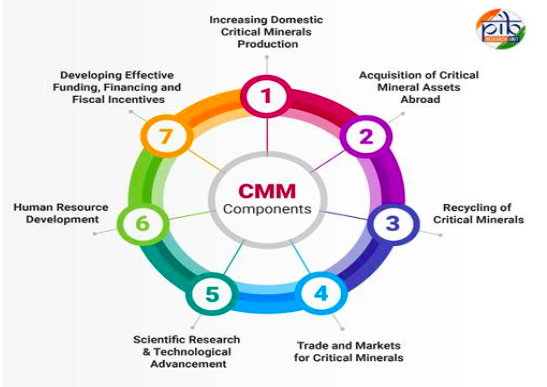10 April 2025: PIB Summary For UPSC
1. National Critical Mineral Mission
(Source – The Hindu, International Edition – Page No. – 8)
| Context |
|
Introduction
- The Geological Survey of India (GSI) will lead 1,200 exploration projects between 2024-25 and 2030-31.
- A committee identified 30 critical minerals, and 24 have been added to a special list under the MMDR Act, 1957.
- These 24 minerals will now be auctioned only by the Central Government.
- A Centre of Excellence on Critical Minerals will be created to update the list and support strategy development.
Importance of Critical Minerals
- Critical minerals are key to clean energy technologies like solar panels, wind turbines, electric vehicles (EVs), and energy storage systems.
- They are also vital for national security and economic growth.
- A limited number of countries control the supply of these minerals, which may cause supply chain problems.
Usage in Clean Energy and Industry
- Solar Energy: Minerals like silicon, indium, and gallium are used in solar PV cells.
- Wind Energy: Rare earth elements like dysprosium and neodymium are used in wind turbines.
- Electric Vehicles: Lithium, nickel, and cobalt are essential for EV batteries.
- Energy Storage: Lithium-ion batteries need lithium, cobalt, and nickel for grid and industrial energy storage.
Objectives of the Mission
- To secure mineral supplies both from within India and other countries.
- To build value chains by improving technology, policy support, and skill development in the mining sector.
Key Targets by 2030-31
- 1,200 domestic exploration projects
- 26 foreign mineral acquisitions by PSUs
- 24 acquisitions by private firms
- 400 kilotonnes of minerals to be recovered from recycling
- 1,000 patents developed in the mineral value chain
- 10,000 people trained
- 4 mineral processing parks and 3 research centres established
- 5 strategic mineral stockpiles created
International Investments
- India is supporting public and private investments abroad in critical minerals.
- Partnerships and MoUs have been signed with countries like Argentina and Australia for lithium and cobalt projects.
Support by IREL
- IREL produces minerals like ilmenite and zircon and has rare earth processing plants in Odisha and Kerala.
- The company supports domestic industries and research.
Conclusion
- The mission supports India’s climate goals to cut emissions by 45% and achieve net-zero by 2070.
- It will help ensure a stable supply of essential minerals for clean energy, promote domestic growth, and reduce dependence on imports.
| Practice Question: Discuss the significance of the National Critical Mineral Mission (NCMM). What challenges does India face in securing a stable supply of critical minerals? (150 Words /10 marks) |
Check this out 09 April 2025: PIB Summary For UPSC

